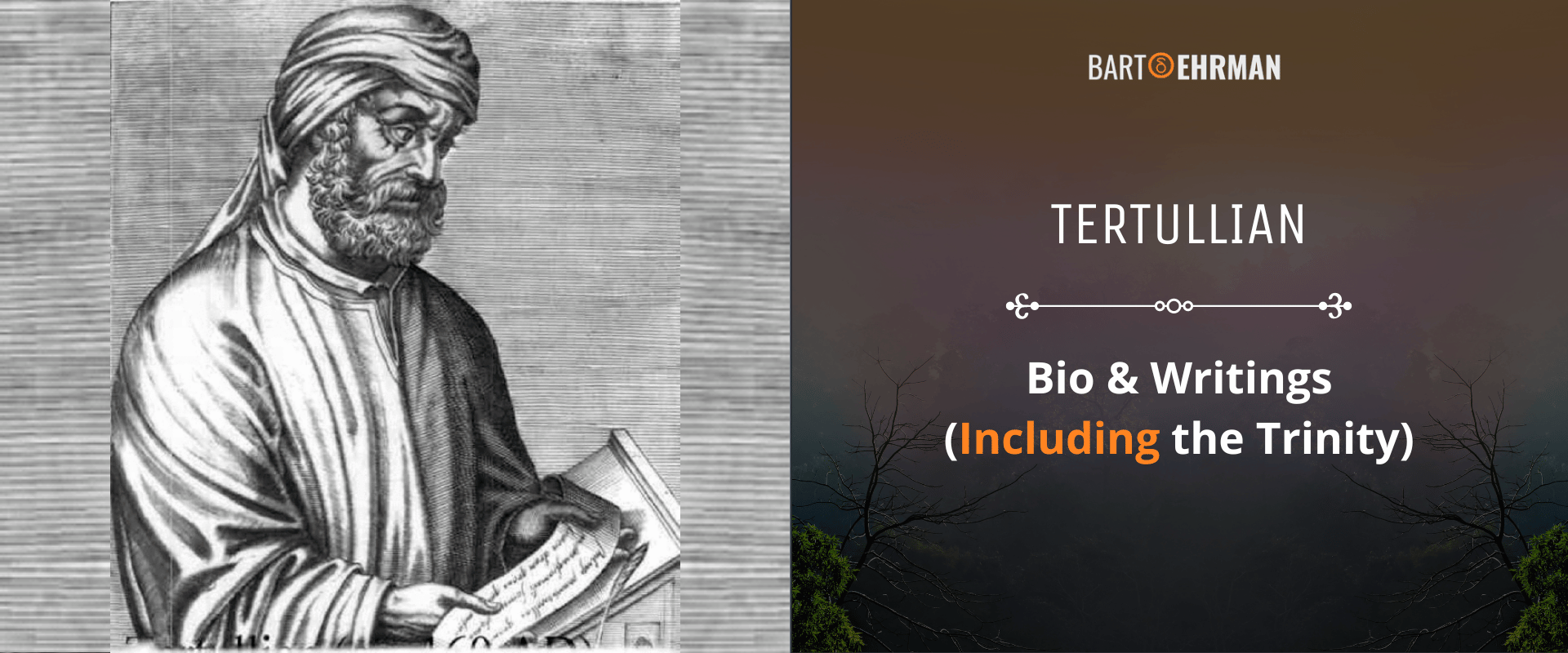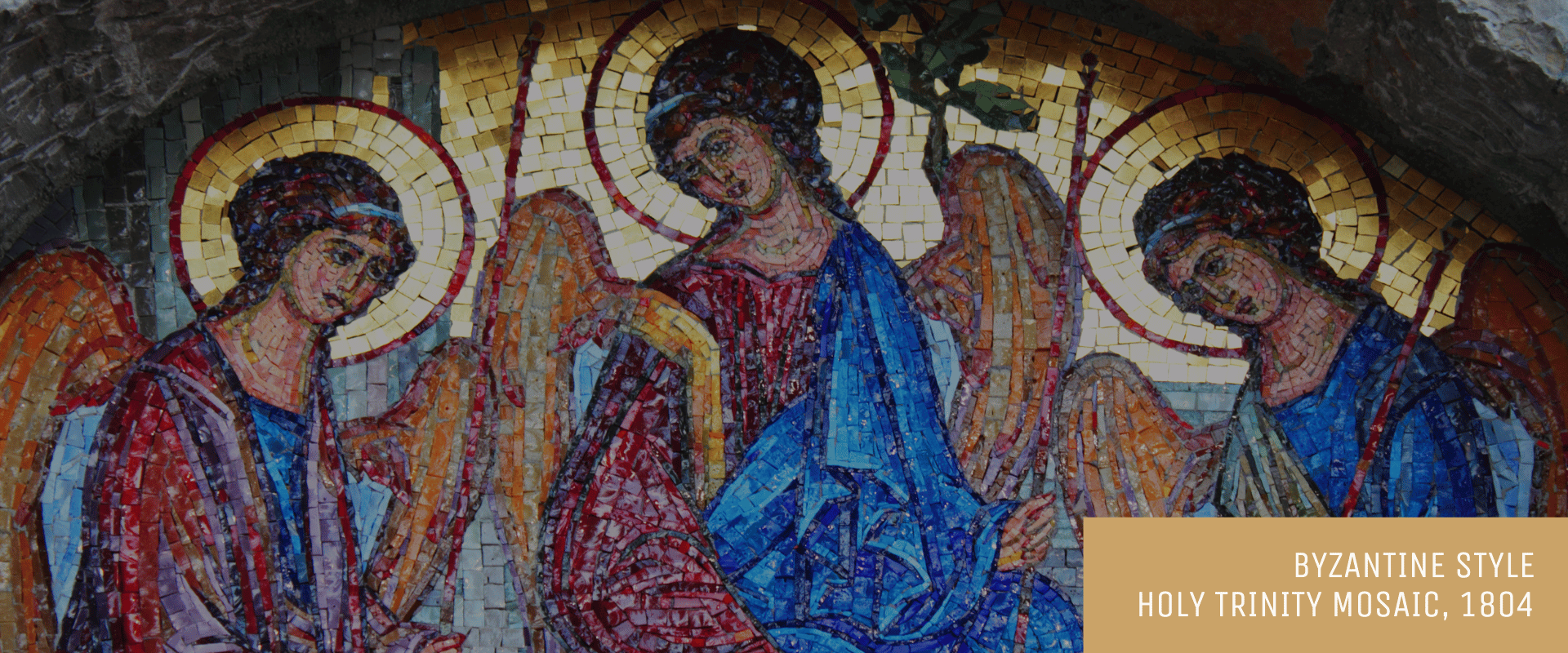Tertullian - Bio & Writings (Including the Trinity)

Written by Joshua Schachterle, Ph.D
Author | Professor | Scholar
Author | Professor | BE Contributor
Verified! See our editorial guidelines
Verified! See our guidelines
Date written: July 15th, 2024
Disclaimer: The views and opinions expressed in this article belong to the author and do not necessarily match my own. - Dr. Bart D. Ehrman
As an early theologian and Church Father, Tertullian provides us with an important historical view of early Christianity in North Africa. Moreover, his voluminous writings offer profound glimpses into the development of Christian thought during the 2nd and 3rd centuries.
A polemical and prolific writer, Tertullian’s forceful rhetoric and unyielding stance on theological matters left a lasting mark on the trajectory of early Christian thought. In this article, I’ll explore the life, writings, and theological contributions of Tertullian, examining his influence as the first Latin Christian author and his enduring impact on subsequent Christian thinkers.

Where and When Was Tertullian Born?
Like most ancient Christian writers, Tertullian didn’t give us many details about his life. Those we know come from veiled references in his own writings as well as two biographical sketches of him made two centuries later, one by Church historian Eusebius of Caesarea and the other by priest and ascetic author Jerome.
Quintus Septimius Florens Tertullianus was born around 155 CE in the city of Carthage in Roman North Africa (modern-day Tunisia), where he would spend his entire life. Carthage was originally founded in the first millennium BCE by the Phoenicians and then developed into a large city-state like Athens or Rome. However, in 146 BCE, the Roman Empire conquered and destroyed the original city.
According to Caroline Winterer, by the time Tertullian was born, Carthage had been developed by Rome into a massive metropolitan trading hub for the Roman Empire with a peak population of about 500,000 people. This meant, by the way, that while the original language of Carthage was Punic, a Semitic language, Tertullian and most citizens of Roman Carthage spoke Latin as their first language.
What Was Tertullian’s Background and Education?
Tertullian spent his entire life in the city of Carthage. However, this afforded him amazing educational resources, as Carthage was the second-largest city in Roman North Africa (only Alexandria, Egypt was larger). By the mid-2nd century and time of Tertullian’s birth, Christianity had spread to Carthage. It appears, though, that he was not born into a Christian family.
Church tradition, based largely on the biographies written by Eusebius and Jerome, says Tertullian was the son of a Roman centurion. Many have also claimed he trained as a lawyer, based partly on the many legal analogies used in his writings. However, in Tertullian: A Historical and Literary Study, Timothy Barnes says that although Tertullian demonstrated general knowledge of Roman law in his writings, it would have been common to any educated citizen of Roman Carthage. Once again, we just don’t know for sure. (Affiliate Disclaimer: We may earn commissions on products you purchase through this page at no additional cost to you. Thank you for supporting our site!)
Both Jerome and Eusebius, again writing two centuries after Tertullian’s death, also write that he was an ordained priest. However, Tertullian never states this, making the claim questionable at best. Moreover, in one of his writings, “On the Exhortation to Chastity,” he seems to place himself among the laity rather than the clergy.
His first work, “Apology,” was written in 197 CE and seems to hint about his conversion to Christianity (“apology,” in this case, means a defense). Based on this date, early scholars of Christianity surmised he had converted not long before this year, but it’s impossible to say for sure. He did convert, however, and in “Apology,” he writes that a real Christian life requires a drastic act of conversion which changes everything. He therefore writes, "Christians are made, not born." He also says that he was married to a Christian wife and even addressed two of his books to her.
As reflected in his writings, Tertullian was not an easygoing person. He wrote vehemently against heretics and other perceived enemies of the Christian life. As William Benham wrote of Tertullian in his 1887 Dictionary of Religion, “His style is harsh, but vigorous and powerful.” This seems to have described Tertullian’s character, as well.
In the approximate year of 207 CE, when Tertullian was 52, he was attracted to a Christian movement known as the “New Prophecy,” but also called Montanism after its founder Montanus. Without going into too much detail, Montanus, a recent convert to Christianity, had declared himself and two women named Prisca and Maximilla as prophets through whom the Holy Spirit spoke. Montanism would be officially condemned as a heresy in 381 CE, but it was highly controversial even in Tertullian’s time.
While it was believed for years that Tertullian left the wider Christian church (or was excommunicated) to become a Montanist, most modern scholars find this assertion dubious. In Tertullian and Paul, for instance, David Wilhite writes that it is far more likely that Tertullian merely believed much of what the Montanists said, much of which agreed with broader Christian theology but remained a part of the wider Carthaginian church. In addition, a later Christian Bishop of Carthage named Cyprian claimed that his entire theology came from Tertullian’s writings. This would be highly unlikely if Tertullian had been condemned as a heretic.
Jerome writes that Tertullian lived a long life, probably dying in the year 220 CE. As the first prolific Latin Christian author, he was the predecessor to such important Latin theologians as the abovementioned Cyprian and Augustine of Hippo. With that, let’s turn to his writings and theology.
FREE COURSE!
WHY I AM NOT A CHRISTIAN
Raw, honest, and enlightening. Bart's story of why he deconverted from the Christian faith.
Over 6,000 enrolled!
Tertullian’s Writings and Significance
Tertullian was an extremely prolific author. It’s beyond the scope of this article to write in detail about every single one of his writings. Instead, I’ll outline some broad themes in those writings, some of which he seems to have innovated.
Tertullian’s writings can be divided into four main groups (see the table below). First, there are apologetic writings, that is, various defenses of Christianity against heretics or non-Christian naysayers. Then we have polemical writings, which either attack certain people or groups or express controversial opinions. Next, there are the dogmatic writings, which argue for the irrefutable truth of certain Christian principles. Finally, we have his writings on correct Christian morality.
Note also that Tertullian used most of his opinions to argue in some way against those he defined as heretics. This is a bit ironic, of course, since he himself was accused of heresy for his Montanist leanings.
Apologetic | Polemical | Dogmatic | Moral |
|---|---|---|---|
Apology | On Prayer | On the Prescription of Heretics | On the Veiling of Virgins |
God
Tertullian is the first Latin writer to use the word “trinity” (Latin: trinitas). However, Dale Tuggy writes that Tertullian used the word God (Latin: Deus) solely to refer to the Father, the ultimate creator of the universe through the agency of his Son. In “Against Praxeas,” he defines his Trinitarian doctrine, writing that Father, Son, and Holy Spirit
are one substance, not one person; and it is said, 'I and my Father are one' in respect not of the singularity of number but the unity of the substance. The very names "Father" and "Son" indicate the distinction of personality. The Father is one, the Son is another, and the Spirit is another.
In this sense, Tertullian anticipated the Council of Nicaea, which would define the trinity as three persons but one substance. However, he also defined the Son as subordinate to the Father, something the Council would have abhorred since this was a principal tenet of a heresy called Arianism.
Baptism
Although he acknowledged that infant baptism was the norm in his church, Tertullian urged people to postpone baptism for everyone until they were not only grown but married. This, he argued, would prevent the danger of a baptized infant falling away from the church and thus corrupting his baptism forever. Likewise, unmarried young people, he argued, were susceptible to sexual temptation and should wait until marriage so that they wouldn’t corrupt their baptism (people were only supposed to be baptized once in ancient Christianity).
In addition, he thought that the benefit of baptism derived not from the clergy member who administered it but from the actual ritual itself. Accordingly, he said it was acceptable for a layperson to baptize another if no clergy were available. The Church did not adopt this doctrine.

Scripture
While Tertullian did not make a canon list of his own, we can see from references in his writings which books he considered Scripture. Among canonical books of the New Testament, he quotes liberally from 1 John, 1 Peter, Jude, Revelation, the Pauline epistles, and the four Gospels. He also quotes from the Shepherd of Hermas, a very popular early Christian book which was later excluded from the canon.
In terms of the Old Testament, Tertullian quoted from most of our canonical books and included two books of the Apocrypha, the book of Judith and 2 Maccabees. He also defended the scriptural status of the book of Enoch.
When interpreting Scripture, he thought that some passages, especially OT passages thought to refer to Christ, should be interpreted allegorically. Most others he interpreted literally. Furthermore, he thought the simplicity of Scripture spoke for itself and needed no complicated explanations.
The Church
Tertullian believed in apostolic succession — the belief that the original authority of the apostles was passed down through bishops. For this reason, when writing to or about Christians he considered heretical, he challenged them to demonstrate evidence of apostolic succession in their communities.
In addition, Tertullian believed the Church should not pardon some sins. His stance was, for example, that people who committed sorcery, fornication, or murder should be permanently excommunicated.
Other Themes/Beliefs
Although later Christian theologians, most prominently Origen of Alexandria and Augustine of Hippo, would make use of Greek philosophy in their writings, Tertullian thought this was deplorable. He wrote that such dependence on philosophy would turn Christians into heretics, prompting one of his most famous quotes: "What has Athens to do with Jerusalem?"
Unlike later Catholic teachings, Tertullian did not believe in the perpetual virginity or the perpetual sinlessness of the Virgin Mary. Also contrary to later Catholic doctrine, Tertullian was an iconoclast. This meant he thought holy images should not be used by Christians and even destroyed whenever encountered.
Conclusion
Who was Tertullian? He was the first Latin Church Father, or at least the first whose writings survive today. While we don’t know a lot about his biography, we know he was born into a non-Christian family in the bustling city of Roman Carthage and was clearly well-educated. After his conversion to Christianity, he used his forceful personality to define Christian doctrine and orthodoxy.
Despite the fact that some of his opinions are no longer held by the Catholic Church, he was undoubtedly a major influence on some of the most famous Christian thinkers, including Cyprian and Augustine.
Tertullian’s writings give historians a fascinating view of 2nd and 3rd century Christian thought in Roman North Africa, including the different sects that existed and how some Christians perceived themselves and their relation to the wider Roman world. For these reasons, he is considered a noteworthy Church Father.
FREE COURSE!
WHY I AM NOT A CHRISTIAN
Raw, honest, and enlightening. Bart's story of why he deconverted from the Christian faith.
Over 6,000 enrolled!
